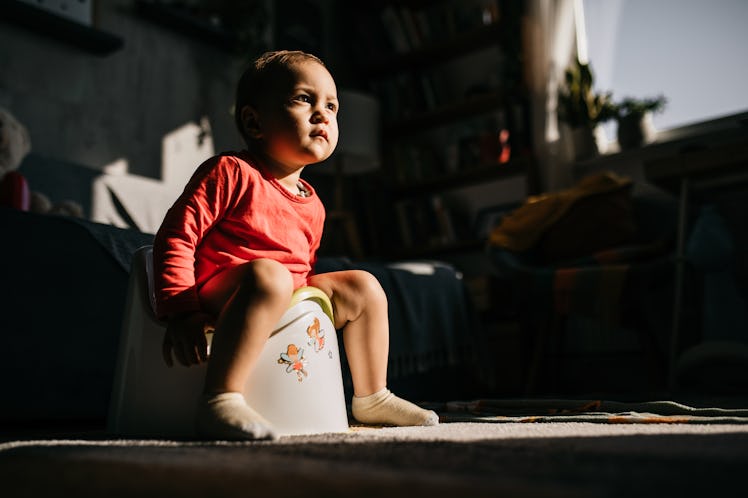What To Do When Potty Training Doesn’t Catch On
Creating a stress-free atmosphere for potty time helps kids adjust to this new responsibility.

When toilet training doesn’t work right away, stress can get in the way of success. One of the best potty training tips is simply to chill. Potty training isn’t a fixed developmental milestone in a child’s life, and the age at which children start toilet training varies among cultures and countries. In the United States, most kids are potty-trained between 2- and 3-years-old, which is generally the age (give or take a few months) when kids have developed the necessary gross motor skills to potty train. And kids are psychologically best prepared to successfully toilet train in the post-toddler years.
Understandably, a lot of parents jump the gun and then get frustrated. Thus the advice: Chill.
“If someone is trying to toilet train an 18-month-old, and it’s not working, the reason it’s not working is that the child is too young,” says Howard J. Bennett, M.D., author of the American Academy of Pediatrics’ book, Waking Up Dry: A Guide to Help Children Overcome Bedwetting.
“As a general rule, if parents are feeling some rush to teach their children to use the toilet, it’s often a sign that things aren’t going to go well,” Bennett says. “Learning to use the toilet is the child’s process of mastering a particular skill. It’s having to recognize that it’s time to pee or poop, to be able to hold those muscles until they can get to the toilet and let go. And so some children will be ready at 2, but others aren’t ready until 3.”
Humans are pretty quick to form patterns where there aren’t any, and any negative experience can be extrapolated into a discouraging toilet gestalt. But one of the biggest stumbling blocks to potty training — and the most subtle — is stress. It’s hard for both parents and children to identify, but very easy to succumb to. This is an important potty training tip to consider.
Avoid using “you” language so you don’t stigmatize the child, and don’t give the kid a chance to say “no.” If diapers need to be changed, parents should acknowledge that reality with their own senses — “Daddy smells a poop,” instead of “Did you poop?”
Why Most Potty Training Tips Don’t Work Immediately
Kids are often put off by the novelty of the new experience. Diapers have been a part of their entire lives up to now, so a toilet just looks like unnecessary work.
Or they could have legitimate physical concerns they don’t always understand or know how to communicate. Sitting on a full-sized toilet without a kid’s seat can be very intimidating — its easy to slip right through the hole. If kids don’t use a stool for their feet, they can have some discomfort in the back of the leg. They may get splashed with toilet water when they drop a deuce, which feels pretty weird at any age, or pass a hard bowel movement, which can really hurt.
“Children are really experts at picking up parental stress,” explains Bennett. “If you feel frustrated, they will feel frustrated as well.”
“Getting frustrated at those earlier, easy-to-fix problems may generate a new problem, where trying to toilet train is simply too stressful to be worth it. Which is too bad, because the toileting process doesn’t have to be stressful at all.”
External Pressures Intensify Potty Training Problems
The fact is that most of the pressure to potty train comes from sources and obligations outside the family — daycare or preschool requirements, grandparent’s standards, comparisons to friends who had early success. But none of that motivates the kid. Instead, it just adds pressure to the parents. In that environment, even benign suggestions to use the potty, no matter how gently they seem to be made, can increase the stress level.
“If it’s not going well, and parents have explored all these things that may have tripped them up, the best thing to do is to take a break,” explains Bennett. “Everybody learns to use the toilet eventually. Everybody. So get the social pressure off, get the family pressure off, get grandma off your back. And then what I suggest is for the next two or three months, stop anything about using the toilet.”
The Most Important Potty Training Tip: Keep Things Positive and Chill
“You make it as positive an experience as you can,” says Bennett. “But you don’t say anything, for a couple of months, about going on the toilet. You’re basically trying to extricate yourself from toilet hell. And during that period of time, hopefully, the child will be thinking, ‘Man, they are off my case, thank heavens.’ And you won’t be unintentionally reinforcing this negative pattern.”
The most important potty training tip of all might be to simply chill. A clean break might seem like a waste of all that previous effort, but it really is as important for parents as it is for kids. The stress that disrupts toilet training affects parents and children together, after all. A break in potty training gives the child time to relax and the parent time to reevaluate. Then after a few months, parents can slowly start again, this time with the right amount of chill.
Potty Training Tips for When It’s Not Working
- Look at your behavior and try to reduce the stress you’re showing as a parent.
- Try incentives that kids can work toward.
- Look at where toilet training is happening. Is it comfortable, or is the child frightened or in pain?
- Avoid language that blames a child. Default to “Daddy smells a poop” rather than asking “Did you poop?”
- Take a few months off and try again.
This article was originally published on